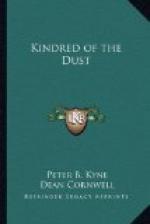Old Hector looked up at his general manager from under his white, shaggy brow.
“Ye, Andrew,” he saluted the latter gently, “I see by your face it’s not welcome news you bring. Out with it, man.”
So Andrew came “out with it,” omitting no detail, and at the conclusion of his recital, the old man wagged his head to emphasize his comprehension.
“My son is not a dull man by any means,” he said presently. “He knows what he knows—a man sure of himself always—and oh, Andrew man, because of the brain of him and the sweet soul of him, it breaks my heart to give pain to him. And what does the doctor say?”
“From a cursory examination he suspects typhoid fever.”
“Ah, that’s bad, bad, Andrew.”
“The boy has the strength of a Hercules, sir. He’ll beat through, never fear.”
“Well, he’ll not die to-night, at any rate,” old Hector answered, “and I can do no good puttering round the hospital to-night. Neither would I alarm his mother and the girls. Send for the best medical brains in the country, Andrew, and don’t quibble at the cost. Pay them what they ask. ’Twill be cheap enough if they save him. Good-night, Andrew, and thank you kindly.” He stood up and laid his hand affectionately upon the shoulder of his faithful servant and walked with him thus to the door. “My good Andrew,” he murmured, and propelled the general manager gently outside, “there’s no need to worry over the dismissal. When the lad’s well, he’ll rescind his order, so, in the meantime, do not leave us.”
“But—if he shouldn’t rescind it?” Daney pleaded anxiously. Although he was comfortably fixed with this world’s goods and had long since ceased to work for monetary reward, the Tyee Lumber Company was, nevertheless, part of his life, and to be dismissed from its service was akin to having some very necessary part of him amputated.
“Tush, man; tush! Don’t be building a mare’s nest,” old Hector answered and closed the door upon him. For The Laird was losing control of himself and he could not bear that any human eye should gaze upon his weakness.
XXVIII
The morning following Donald’s admittance to the hospital, the company doctor confirmed his original diagnosis that the patient was suffering from an attack of typhoid fever. The disease had evidently been two weeks incubating, for the woods boss reported that his superior had complained of being “under the weather” for ten days before yielding to the former’s repeated advice to go down to Port Agnew and have the doctor look him over. As a result of Donald’s stubborn refusal to acknowledge his illness, the disease had reached a fair stage of development by the time he received medical attention.
He was not delirious when The Laird and Mrs. McKaye reached the hospital that morning, however, they were permitted to see him for but a few minutes only.




